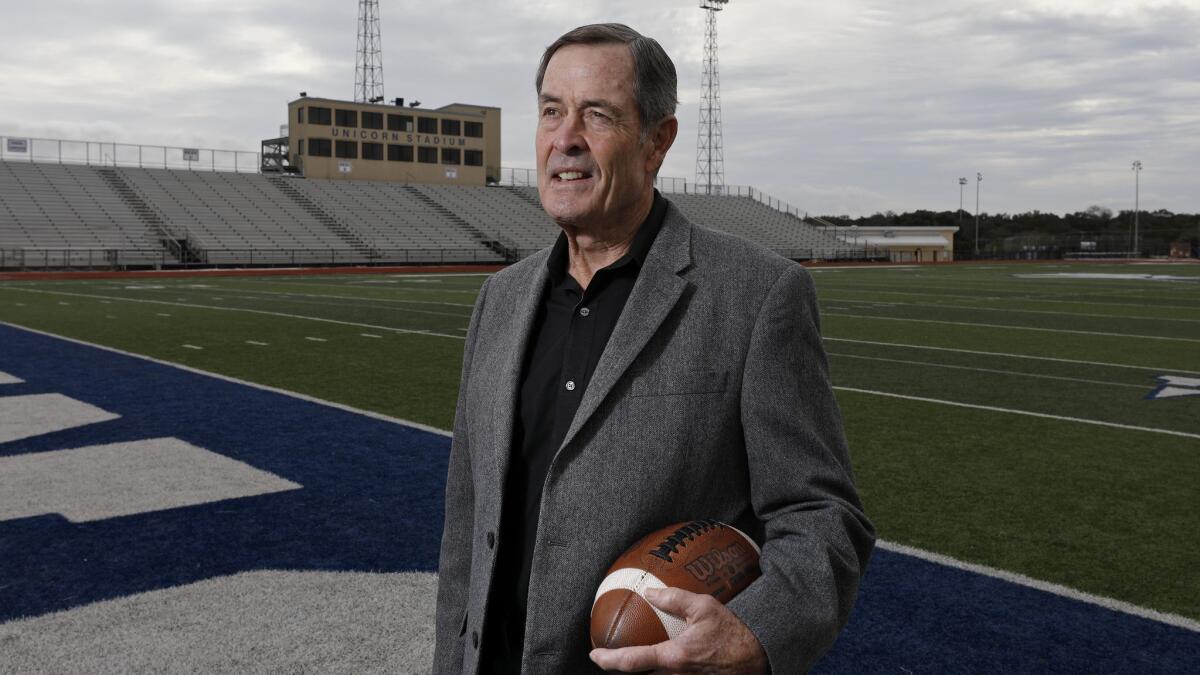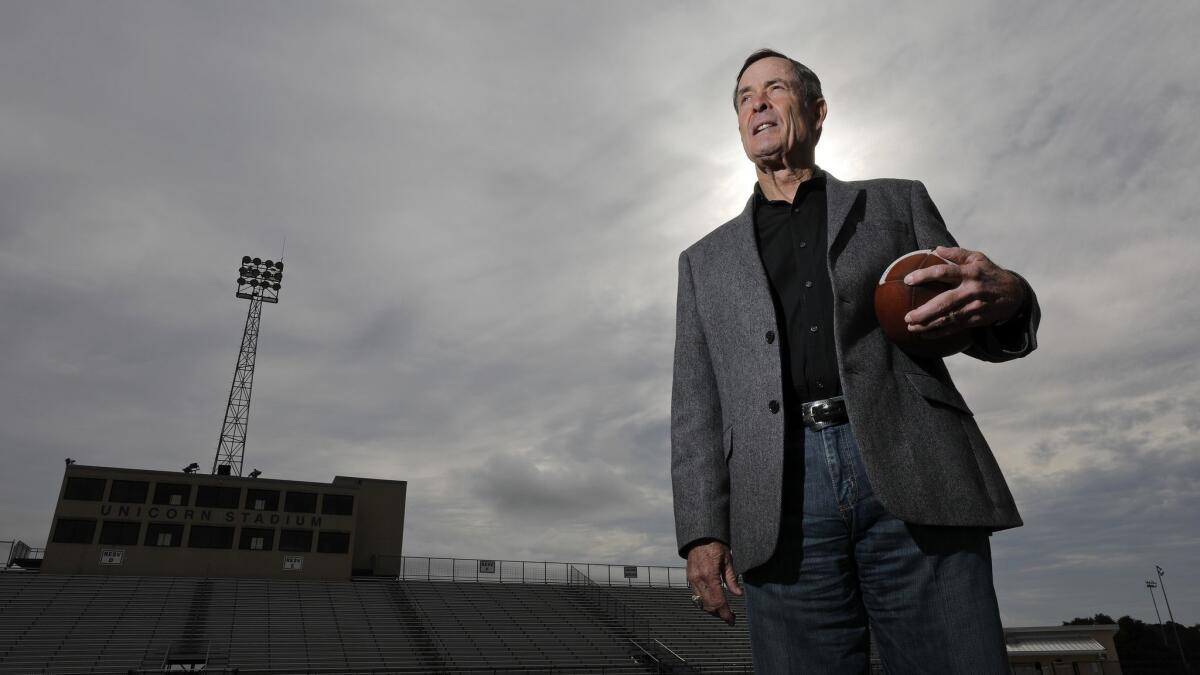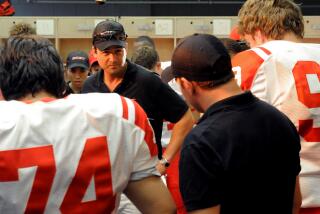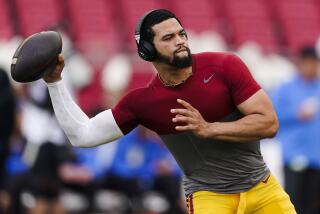As Kliff Kingsbury prepares for a new life at USC, his heart remains in Texas
The advertisements hit Kliff Kingsbury’s inbox, each picture offering a future seemingly more breathtaking than the next. The properties stretch across Southern California, a place the man from small-town Texas had somehow always imagined himself, and, given the wild success he has achieved in his 39 years, a luxurious life in the big city is fully attainable and waiting at his fingertips.
The house or condominium will come for Kingsbury, USC’s pick to save its offense, a hire that was so unfathomable a month ago that his new boss has compared it to winning the lottery.
Kingsbury is a no-brainer investment for the Trojans, who surely made him richer than he ever could have conceived when he was tossing footballs through a tire in New Braunfels, Texas, but the coach does not feel like a million bucks.
Despite the excitement of seeing the beach and the majestic blue of the Pacific, walking onto a new campus, meeting new faces and shaking new hands, slapping on a new university’s polo shirt, it has taken Kingsbury only so far from Lubbock, Texas. His heart remains there and he still proudly wears Texas Tech black and red.
“It’s been hard,” Kingsbury said last week from his office in USC’s McKay Center. “You just miss the people, you miss the players, you miss interacting with them. You’ve seen them every day for five, six years and checking on them, and you want to know how they’re doing and how everything is going, but you have to try to keep your feet where you are and focus on this new phase of your life.
“When it first happens, you feel like you lost your family, because it’s just gone, and you’re kind of lost and don’t know what to do. And then you want to be a part of a new family.”
It is easy to look at Kingsbury and see only the guy who has it all: movie-star good looks that have drawn comparisons to Hollywood leading man Ryan Gosling; the moxie to approach any woman with a confident stride; and one of the most brilliant minds for offensive football that made him the hottest name on the college and NFL market the moment his alma mater let him go after six seasons.
But what is just as easy to miss is the man who works like he doesn’t have anything. Kingsbury famously starts his day in the 3 o’ clock hour, makes sure he’s at the facility by 4 — rumor has it that number has gotten earlier because staffers at Texas Tech started trying to beat him — and does not go home until 9 p.m., when his head swiftly hits the pillow so he can do it all over again. He learned this from his father, Tim, the former high school football coach and decorated Vietnam War veteran, and his mother, Sally, the government teacher and town mom who was running about 10 miles a day before cancer took her.
Pushing 40, Kingsbury says he wants a family that exists outside of football too. There’s a reason the official USC release announcing his hiring as offensive coordinator and quarterbacks coach included the phrase, “he is single.” But to this point, the game has been enough to sustain him, and he has been unwilling to make time for anything — or anyone — else. He chose Los Angeles, a city he loves and has visited often during his short off-season, almost as a challenge to himself.
“I’m trying to be better,” he says. “I think moving out here, I kind of promised myself, all right, we’re going to try some different hours, try to improve the quality of time off that we do have. Still trying to sort out the work-life balance, I would say.”
He pauses, before adding, “If you can’t do it here, then I got real problems. I gotta go see somebody.”
He could just as easily be trying to figure it out across town with Rams coach Sean McVay, Kingsbury’s friend who also called with a job offer when he became available. The reasons Kingsbury decided to stay in college football and finish his early-morning commute near downtown L.A. are tucked a world away, hidden in a special place whose name is now etched onto the nameplate that marks the entrance to his USC office:
New Braunfels, Texas
::
The craft beer is going down smooth, the country music is playing in the background, and Tim Kingsbury has a story he would like to tell, if his dang feelings would just let him get through it.
This one never gets old because it makes him feel young. It was 1997, Kliff’s senior year at New Braunfels High. The Unicorns had just been moved up from 4A classification to 5A, where they would play in a district with all the big San Antonio schools. Dave Campbell’s Texas Football magazine summed up their plight thusly:

“Pity poor New Braunfels,” Tim says from memory.
“The whole town freaked out,” he continues. “They’re not going to win a game. They were telling the kids that. I got all the kids together and said, ‘Don’t listen to that.’ ”
He has to stop himself. The man who was given a Purple Heart because he took a bullet to the jaw for his country, who brought his own brand of boot camp to New Braunfels football, is tearing up over his grilled chicken wings.
“I’m sorry,” he says, embarrassed. “I get so emotional. It’s just that … I believed in those kids. You know, the older I get, the more I do this. …”
Tim did not know he wanted to be a football coach. He played in high school, and when he came back from Vietnam — he does not like to talk about what happened over there; they rewired his jaw and that was that — he went to school to be an elementary school teacher, just like his dad. That’s where he met Sally, at Southwest Texas State in San Marcos, where she was also studying education. When Tim struggled with his transition back to civilian life, Sally picked him up. She got her first teaching job at New Braunfels High, so Tim followed.
The head coach there, Jim Streety, heard Tim had a football background and asked him if he wanted to help coach the middle school. Streety could also see Tim had a unique perspective.
“I knew that he was damn lucky to get out of there alive,” Streety says, “and I knew that he was damn thankful for it.”
Wasn’t long before Streety made Tim his defensive coordinator. Tim and Sally’s boys, Klint and Kliff, spent most of their time up at the high school, sharing their parents with kids from all over New Braunfels, a charming river burg nestled in Texas’ sprawling Hill Country along Interstate 35 between Austin and San Antonio, then a town of about 20,000.
Tim didn’t tell his sons much about the war, but they understood that it shaped him. Sally liked to keep things positive anyway, and they built a household defined by constant activity. If you were awake, you were doing something physical. Klint, the older brother by two years, looked forward to the day his mother wouldn’t make them run 5Ks anymore. He also wished Kliff, that twig-thin little squirt, would stop beating him and his friends in sports.
“And he absolutely let you know about it,” Klint says. “After a while, you got used to it. He’s an incredibly gifted trash talker that can play any sport like crazy.”
At 8, Kliff knew he was going to be the next Joe Montana. He always wore No. 16. As the talented son of a coach, it was assumed he would one day lead the Unicorns, but Tim did not want to coach his boys. It was a relief to him when Streety got the job at San Antonio Madison in 1991. Tim went with him, even though he was offered the head job at New Braunfels.
“I wanted them to establish themselves,” Tim says. “I didn’t want people to say, ‘He’s playing because his dad is the coach.’ ”
But, in 1995, the New Braunfels job came open again, and Tim decided to return. Klint was a senior star on the defense, and Kliff was the starting quarterback on the JV team who had proven himself enough. Still, Tim didn’t take any chances with perception.
“I was harder on my own kids than I was on anybody else,” he says. “I probably took it to the extreme.”
The program had taken a step back since Tim left, and now they were going to be playing up as one of the smallest high schools in 5A. But that senior class had been building toward the 1997 season their whole lives, and they had a born leader in Kliff Kingsbury.
“Everybody looked up to him,” says Nolan Bluntzer, a junior left tackle for those Unicorns.
That fall, there was nothing to pity about New Braunfels, which lost one game during the regular season and shocked the state by winning district. The team had the whole town believing, and that’s exactly what the fans would chant during all those thrilling comeback wins — We be-lieve! We be-lieve!
Kliff still did not have a scholarship offer, but he knew Texas Tech had its eye on him. He played with a fire that did not have to be coached out of him.

Tim picks up the tale with the state quarterfinal game against San Antonio power MacArthur, which had handed the Unicorns their only defeat.
“They get ahead of us 14-0 at the half,” Tim says, “and the kids are all in the locker room, and the only thing I say to them as they come in…”
Tim is suddenly all choked up again.
“We got them right where we want them!” he gets out.
New Braunfels won in triple overtime. It was pure delirium. Two wins away from a state title, and next up was Houston’s Alief-Hastings in the Astrodome.
The Unicorns’ story was apparently resonating beyond Texas. Tim got a call from a man who was interested in doing a football movie, possibly about his team. Tim was flattered but disregarded it. Heck, they were in the middle of the playoffs.
“He ended up doing “Remember the Titans,’ ” Tim says.
Tim took the boys out to Houston a day early so they could have a practice in the Astrodome. He’d seen some other teams get lost on game day looking up at the ceiling there, and he wanted the Unicorns to spend the whole practice staring up into the rafters it if that’s what was needed to calm their nerves. Yes, it really was like a movie.
The dream ended the next day, 46-23, but it would stay a part of all of them.
“It was a group of kids that grew up together,” Kliff says, “always loved each other. Some of the most competitive people I’ve ever been around in my life to this day were on that team.”
Tim Kingsbury was named New Braunfels’ “Citizen of the Year” that year. With Sally by his side, it was a shared honor.
“I was just a football coach,” he says.
::
Looking back, Kliff knows how good he had it.
“Storybook upbringing,” he says.
But after Kliff left New Braunfels for Texas Tech — he got that scholarship offer, of course — the family’s story began to change course in ways so profound the Kingsbury men grapple with it 20 years later.
The changes started when Tim abruptly retired from coaching before Kliff’s redshirt sophomore year at Tech. Mike Leach had just been hired to bring his pass-happy “Air Raid” offense to Lubbock, and, with Kliff slated to start, Tim did not want to miss a minute. He felt it would not have been fair to his players if he was always running off to Kliff’s games when he should have been watching film with them on Saturdays. He planned to go back to coaching when Kliff’s college career ended. Who was Tim Kingsbury if not a football coach?
Kliff appreciated the sacrifice Tim made to attend his games, but he was undeniably closer with Sally. Kliff and Tim were almost too much alike, so combative in their competitiveness that Tim had to tell his offensive coordinator at New Braunfels that he would be the one to deal with Kliff during games. Sally and Klint were the social animals of the family, and Sally was the only person Kliff would actually talk to about anything once he was out of the home.
“She was the one person I ever confided in,” Kliff says. “My dad, he’s an incredible man, but I was a mama’s boy.”
When the cancer came, Kliff was off trying to make it as a NFL quarterback, playing behind established starters like the New England Patriots’ Tom Brady and the New Orleans Saints’ Drew Brees. At 51, Sally had been diagnosed with soft tissue sarcoma that first appeared in her right thigh. She never doubted that she would beat it, despite the doctors’ caution, and that was exactly how she had raised Kliff to think. It had served him well in football, and he was going to win here too.
Even as Sally deteriorated, she would not show it to Kliff when he would call to check on her.
“Kliff maybe didn’t realize how sick she was at the end,” says Janie Streety, Sally’s best friend. “Close to the end, she could barely speak, and then Kliff would call, and she would talk. She was so strong for him.”
When Sally was moved to hospice care, Kliff, then a backup quarterback with the New York Jets, came home to say goodbye. On Dec. 16, 2005, she died.
Kliff returned to New Braunfels for the memorial service. An estimated 2,000 people came to pay their respects. The hundreds the church couldn’t hold streamed out the door along State Highway 337, where a large water tower that said “UNICORN COUNTRY” stood nearby as a reminder of the family legacy.
“Still the hardest thing I’ve ever been through,” Kliff says, “and nothing will ever touch that.”
Kliff took in that scene from the funeral, listened to all those people’s words about what she had meant to them. Some became teachers because of her, they told him.
“I remember thinking, I hope one day I can touch half as many people as my mom did,” he says.
Kliff went back to New York to finish out the season, heartbroken, his spirit beaten for the first time in his life.
Tim never went back to coaching as he had planned. The 2 1/2 years he spent by Sally’s side as her caretaker extended his time away from the game, from the grueling demands of his former obsession, and had fundamentally altered his DNA.
“I just finally realized that there’s life after football,” Tim says.
Tim met Jan Thomen in 2006 and eventually remarried. He received more offers in the coming years to return to coaching, this time at the college level, but he stayed away, preferring to spend his days hunting big game and being there for the boys.
And, hey, maybe he could still live vicariously through Kliff.
His career as a quarterback came to an unceremonious end in 2008 after a few stints in the Canadian Football League, and he needed to find his next thing. Kliff, like his father three decades before him, did not want to be a coach. He’d seen the dedication it took firsthand. He considered other paths.
“Real estate or some sort of trader,” Kliff says, “something where you can work hard at it and try to make a lot of money.
“Then, fate intervened.”
Dana Holgorsen, a former Texas Tech assistant coach who was then at Houston, called Kliff and asked him to join the Cougars’ staff as a quality-control staffer.
Life after football could wait.
::
Of all the places for Kliff to lose control of his image, Lubbock should have been the last one. Texas Tech was his alma mater. They knew him. But during that first season in 2013, a local shop had an irresistible idea. The T-shirts said “OUR COACH IS HOTTER THAN YOUR COACH,” and they flew off the shelves.
Kliff was not happy. He worked to have production stopped.
Now, all anyone wanted to talk about was his appearance. He was willing to play that up — to a point. And sure, people talked up his prolific offenses too. The way Tech played, the Red Raiders were having so much fun out there it looked like they could have been drawing up plays in a sandlot.
Kliff had become such a celebrity that he could not go out in Lubbock without being mobbed. In response, he stopped going anywhere but his home and the football facility, which suited his priority system just fine.
“I’ve never seen anybody work harder than he did in that job,” Jim Streety says. “That boy is a football coach.”
It took a personal toll, but you would never know it. Kliff would not show that to his players. As time passed, to have any semblance of a life of his own, he would have to escape to Los Angeles, Las Vegas or locales abroad. He once went to Brazil with Brady and Gisele Bundchen, and, sure, associations like that didn’t exactly paint him as a down-home guy.
This year, in his sixth season at Tech, Kliff needed to show real improvement to keep his job. The Red Raiders, plagued by their porous defense, lost their last five games to finish 5-7. It felt to Tim Kingsbury that nobody at Tech wanted to fire Kliff, but it just had to be done. After the season-ending loss to Baylor, Tim thanked athletic director Kirby Hocutt for the support he’d shown Kliff just hours before he knew the man was going to fire his son.
Just as he had been with Sally, Tim stayed close by Kliff’s side.
“Dad,” Kliff told him, “this is probably good, because if this hadn’t happened, I’d probably be there until I was 60.”
That was a very Kingsbury way of looking at the situation, and sure enough, Kliff’s phone started buzzing soon with new opportunities. Tim felt Kliff’s ego perk up, and it just so happened that some of those jobs were in Los Angeles, one of Kliff’s favorite cities.
Kliff’s family and friends all hope L.A. will mean more time for himself, and, if he happened to meet the right woman … well, they try not to get carried away. At the minimum, he will be able to blend in walking down the street, a clear step in the right direction.
Kliff had his new city, but he still had a football decision: USC or the Rams?
As always, he thought about his mother, what she stood for.
“There’s that void that I’m still chasing to this day,” Kliff says. “You can’t fill that.”
Kliff can’t bring Sally back, so instead, he chases a feeling, one that ultimately led him back to college football for one more go of it.
“The relationships I’ve made coaching from the first job I got at Houston to being let go at Texas Tech, it wakes you up in the morning,” Kliff says. “You hear the stories of kids going on to have success, do different things in their life, there’s not a better feeling.
“Watching my parents have the impact on young people in my community has been a big part of what I’m doing and why I’m doing it.”
Twitter: @BradyMcCollough
More to Read
Go beyond the scoreboard
Get the latest on L.A.'s teams in the daily Sports Report newsletter.
You may occasionally receive promotional content from the Los Angeles Times.







